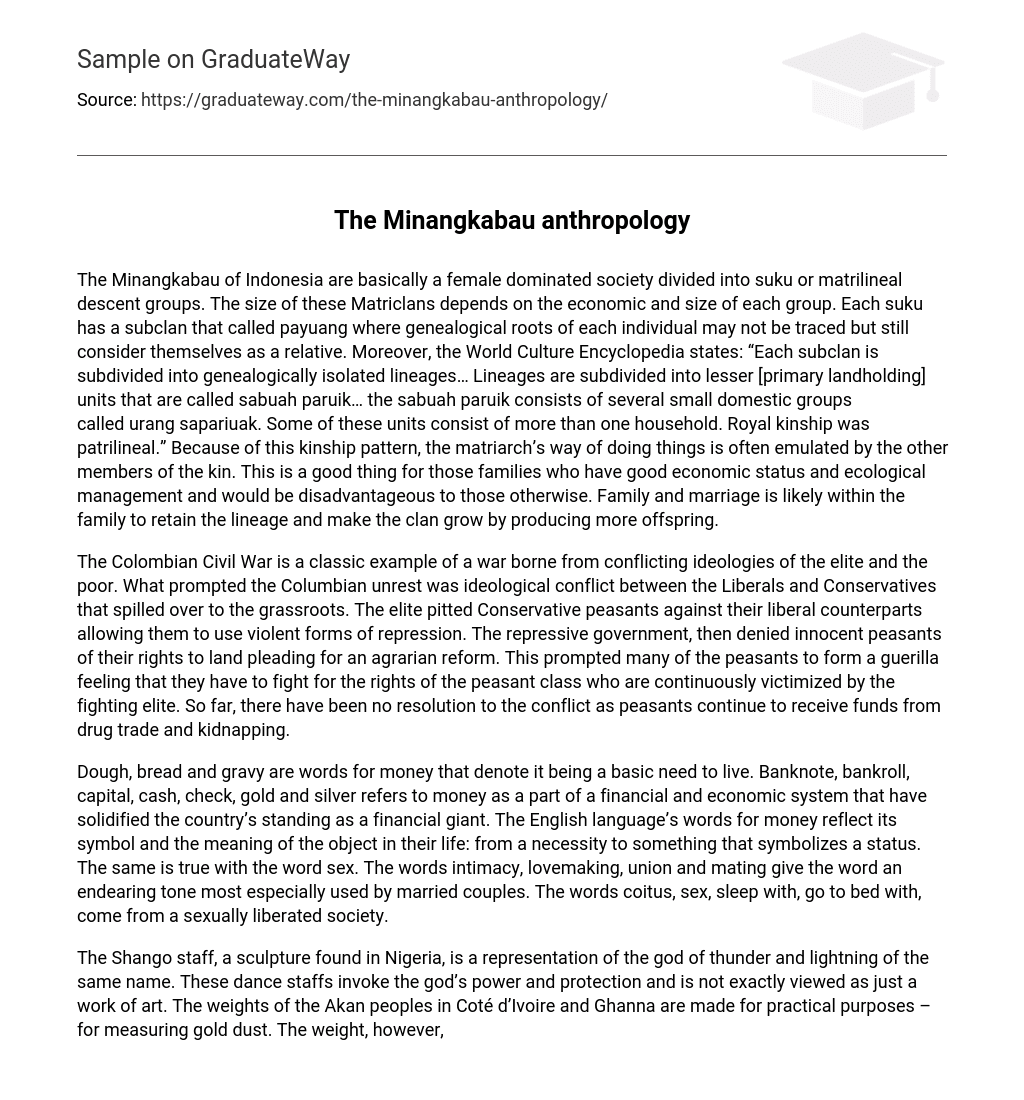The Minangkabau of Indonesia are basically a female dominated society divided into suku or matrilineal descent groups. The size of these Matriclans depends on the economic and size of each group. Each suku has a subclan that called payuang where genealogical roots of each individual may not be traced but still consider themselves as a relative. Moreover, the World Culture Encyclopedia states: “Each subclan is subdivided into genealogically isolated lineages… Lineages are subdivided into lesser [primary landholding] units that are called sabuah paruik… the sabuah paruik consists of several small domestic groups called urang sapariuak. Some of these units consist of more than one household. Royal kinship was patrilineal.” Because of this kinship pattern, the matriarch’s way of doing things is often emulated by the other members of the kin. This is a good thing for those families who have good economic status and ecological management and would be disadvantageous to those otherwise. Family and marriage is likely within the family to retain the lineage and make the clan grow by producing more offspring.
The Colombian Civil War is a classic example of a war borne from conflicting ideologies of the elite and the poor. What prompted the Columbian unrest was ideological conflict between the Liberals and Conservatives that spilled over to the grassroots. The elite pitted Conservative peasants against their liberal counterparts allowing them to use violent forms of repression. The repressive government, then denied innocent peasants of their rights to land pleading for an agrarian reform. This prompted many of the peasants to form a guerilla feeling that they have to fight for the rights of the peasant class who are continuously victimized by the fighting elite. So far, there have been no resolution to the conflict as peasants continue to receive funds from drug trade and kidnapping.
Dough, bread and gravy are words for money that denote it being a basic need to live. Banknote, bankroll, capital, cash, check, gold and silver refers to money as a part of a financial and economic system that have solidified the country’s standing as a financial giant. The English language’s words for money reflect its symbol and the meaning of the object in their life: from a necessity to something that symbolizes a status. The same is true with the word sex. The words intimacy, lovemaking, union and mating give the word an endearing tone most especially used by married couples. The words coitus, sex, sleep with, go to bed with, come from a sexually liberated society.
The Shango staff, a sculpture found in Nigeria, is a representation of the god of thunder and lightning of the same name. These dance staffs invoke the god’s power and protection and is not exactly viewed as just a work of art. The weights of the Akan peoples in Coté d’Ivoire and Ghanna are made for practical purposes – for measuring gold dust. The weight, however, is designed using the lost-wax method resulting in a unique pattern for each weight. Art in my opinion, is anything that pleases the eye of a person. Because of the subjectivity of calling something an art, what one may think of as art may not be the case for another. Abstract art is a case in point. Art is definitely based on culture many are influenced by their beliefs, and most have a meaning and a message embedded in it. In my research, the definition of art varies and is considered a problem, but it basically is the arrangement of elements to please the senses.
The Kayapo, as an indigenous people, can also be called the keepers of the Brazilian rainforest heritage. Where man’s constant need for development has destroyed the environment, the Kayapo guards them for their own benefit. While modern Brazilians want progress, the destruction and displacement of the tribe and their rainforest are not what they should be after. Moreover, this invasion is a double-edged sword that can pose a threat to the rich culture of Brazil, and also reduce the number of visiting tourists who are interested in the diverse subcultures of the country. And while the project will rake in money for businesses, there is a two-fold manifestation of harms: the Kayapo become oppressed with their lives and livelihoods taken from them, which also makes them resort to desperate means that further degrade the environment they have taken care of.





